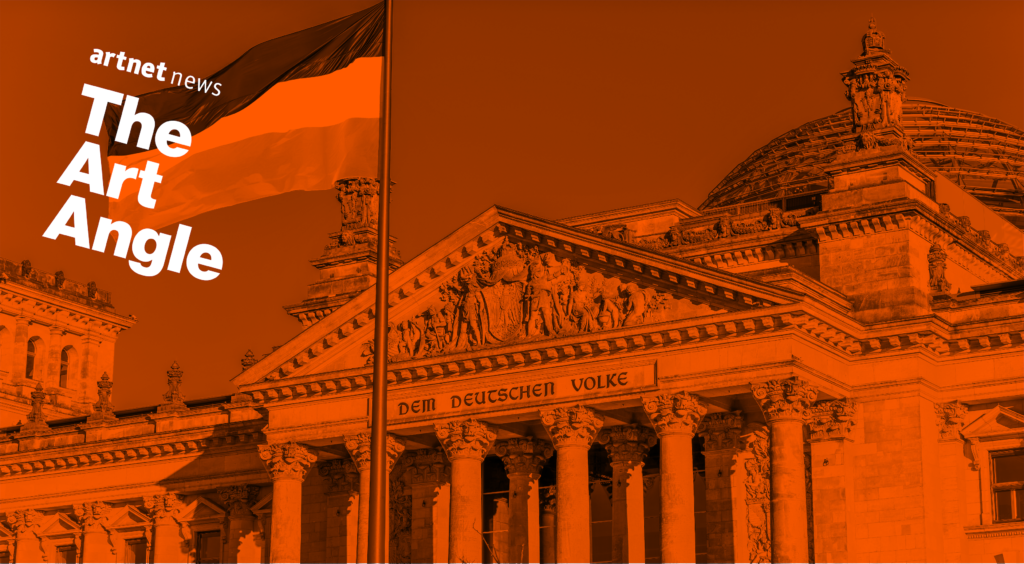The Art Angle
The Art Angle Podcast: Why Germany’s COVID-19 Relief Plan Is the Envy of the Art World
On this week's episode, European editor Kate Brown explains how Germany is setting the standard for supporting the arts in our current crisis.

On this week's episode, European editor Kate Brown explains how Germany is setting the standard for supporting the arts in our current crisis.

Artnet News

Welcome to the Art Angle, a podcast from Artnet News that delves into the places where the art world meets the real world, bringing each week’s biggest story down to earth. Join host Andrew Goldstein every week for an in-depth look at what matters most in museums, the art market, and much more with input from our own writers and editors as well as artists, curators, and other top experts in the field.
Although the coronavirus pandemic is first and foremost a public-health emergency, it rapidly proved to be a deep financial emergency, too. With businesses and cultural institutions around the world forced to shutter en masse in the face of social-distancing regulations, questions loom large about how the global economy and the workforce will endure a prolonged period in which all but “essential” laborers must work from home—or not at all. This proposition is especially worrisome in the art industry, where so many artists and small businesses weather precarious conditions even in the best of times, making them especially vulnerable to financial ruin in our current extraordinary moment.
Yet different Western nations are responding to the cultural crisis in very different ways. The United States hammered out a roughly $2.2 trillion rescue package that contained only $300 million specifically earmarked for arts and media causes, and conservative politicians attacked even this paltry amount as wasteful spending. In contrast, Germany announced a federal aid package featuring a whopping €50 billion ($54 billion) to be distributed to freelancers and small businesses, including those in the arts, while the country’s culture minister praised artists as “not only indispensable, but also vital, especially now.” Even more assistance came from the city-state of Berlin, which began funneling €5,000 payments to individual freelancers almost instantly with the promise that “there will be enough for everyone.”
On this week’s episode, Artnet News’s European editor Kate Brown calls in from her home in Berlin to discuss all sides of Germany’s stunning cultural rescue plan. How did a country known for its sometimes-daunting bureaucracy manage to assemble such a generous bailout in such short order? What kind of political climate enabled it? And what does the package mean for the future of the arts in Berlin and Germany at large once the crisis finally ends?
Listen above and subscribe to the Art Angle on Apple Podcasts, Spotify, SoundCloud, or wherever you get your podcasts. (Or catch up on past episodes here on Artnet News.)
The Art Angle Podcast: The Unbelievable True Story of the Mystical Painter Agnes Pelton
The Art Angle Podcast: Three Ways Coronavirus Will Transform the Art World
The Art Angle Podcast: Why Art and Fashion Need Each Other Now
The Art Angle Podcast: What Does an Art Scene Look Like Under the Coronavirus?
The Art Angle Podcast: How an Art-Dealing Prodigy Became the market’s Most Wanted Outlaw
The Art Angle Podcast: Is the Museum of Ice Cream the Future of Art, or Just a Sugar Rush?
The Art Angle Podcast: What Is Saudi Arabia Trying to Do With Contemporary Art?
The Art Angle Podcast: How Hollywood Finally Fell for the Art Market
The Art Angle Podcast: How Jeffrey Epstein Made the Art World His Hunting Ground
The Art Angle Podcast: How the Art World Fell Under the Spell of the Occult